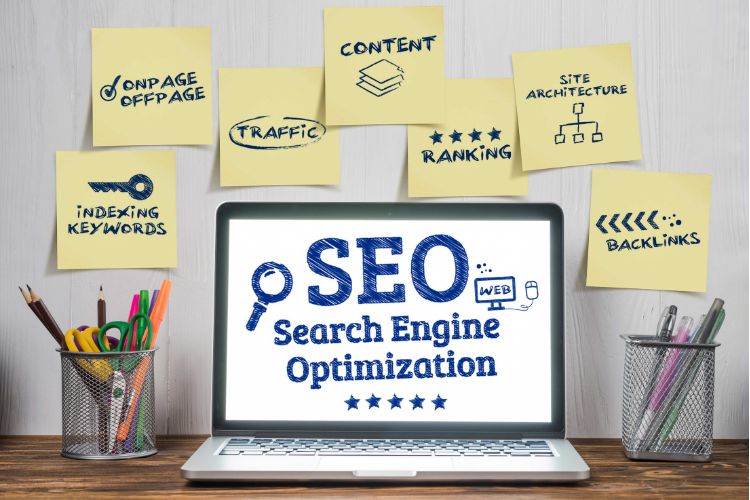Leads are the name of the game when it comes to real estate, and without them, your business won’t generate an income. But how do you find those leads?
There are certainly lots of ways to spend lots of money (and time) when it comes to advertising your real estate services, but some of the best ways are the simplest – an up-to-date digital footprint that provides your potential clients with relevant information that meets their needs.
Online marketing is playing a bigger role in real estate these days, and both content marketing and SEO allow you to take advantage of Google and help ensure you show up in search results.
But which – content marketing or SEO – is best for generating leads?
When you only talk about my real estate services?
Let’s start with the concept of your real estate brand and only talk about your real estate services.
Should you do this? The simple answer is no because your real estate brand will be boring.
When you go to a BBQ, do your friends only talk about their day jobs? No way. Imagine if your friends who are tax accountants only spoke about tax law, or your friend who is a dentist only talked about dental hygiene; how dull would that be?
By now, you should realise that real estate is about relationships – making friends and influencing people. There are certainly a lot of agents out there whose only message is “list and sell your property with me” or “get a free appraisal”. Being one-track with your messaging will result in people unsubscribing or unfollowing you. You need connections that last the distance, i.e. it could be 9 years between transactions.
Where you can be single-minded with your messages is with your SEO marketing activities.
Let’s explore the difference between content marketing and search engine marketing.

What is real estate content marketing?
Content marketing involves creating valuable and engaging information to attract people to use your real estate brand. Your content assists in establishing your authority, likability, and trustworthiness in an industry where emotions often run high. It is like the bait at the end of a fishing line that draws people in.
Content marketing can be used effectively by real estate agents to attract prospects. Content such as real estate blogs, property market articles, guides and reports allow you to educate prospective sellers or landlords. Your content doesn’t need to be wholly related to your products and services.
Great examples of real estate content
You’ll be familiar with several major internet brands that use content marketing to grow not only the visibility of their website but also their brand reputation. Popular examples include houzz.com.au (a directory for finding home renovation professionals), apartmenttherapy.com (a media company) and realestate.com.au/news (a home listing portal).
Now, you might think that you can take a shortcut and use the content on these sites to promote your real estate business, but the trouble is that if you share or post another site’s content, you are only leading people to their website, not yours. It’s therefore important to create your own unique content that is on brand with who you are and what services you offer.
Create interesting real estate content
Think about the information homeowners and property investors need to know about the local market. What do home sellers need to do in advance of listing their property for sale or lease?
Show readers how well you can sell not only a home but also the lifestyle that is afforded to those who choose to live in the area. When people are not in the real estate market to transact, what tips can you share about owning, maintaining or styling a home?
Distributing your real estate content
Once written, your real estate content is uploaded to your website and primarily distributed through social media channels and email newsletters. It’s important to use headlines and email subjects that capture attention, i.e. as people scroll through their social feed or email inbox, they will stop to read.
It’s also important to break up your content into subheadings, bullet points, numbered instructions or use pull-out quotes. The easier it is to scan your content, the further down the page people will read. And you get extra kudos from search engines such as Google for keeping readers on your web page for long periods of time.
Effective content marketing warms up potential clients to you and your real estate brand and keeps you front of mind.

What is Search Engine Optimisation (SEO)?
If you have a website, whether a personal or company real estate site, you will have heard the term SEO. In simple terms, it is a process of improving your website to help increase your visibility on search engines like Google.
SEO uses keywords, on-page optimisation, and link-building activities to rank your website higher in search engine results pages (SERPs).
Keywords and phrases specific to real estate
SEO is an art of sorts; you need to become familiar with the types of words and phrases that are commonly typed into Google and ensure that those terms feature across multiple pages on your website. In particular, your real estate ‘services’ pages that talk about selling, leasing or managing a property.
SEO is about identifying what gets typed into Google most frequently by people who live or own homes in your catchment area. For example, in Australia and New Zealand, we call property professionals real estate agents; in the USA, the terms are real estate broker or realtor, and in the UK, they are estate agents. This shows how different places and people use different terms.
Showing up in real estate search results
If you are a sales agent, SEO helps people find your website when searching for information relating to real estate sales. If you specialise in property management, SEO will help property investors to find your site. And, if you are a buyers agent, SEO will help home buyers to discover your services.
Much like content marketing, SEO is something you need to keep on top of. Think about how you expect people to find your website. Will they type in “best real estate agency”, “how to sell my home”, or “real estate agent commissions”?
Building links with other real estate websites
Link-building is also a big component of SEO and requires finding other high-quality real estate-related websites (with good rankings) that are happy to put a link on their website that takes people to your website. The fact that another site is essentially recommending your site helps increase your search engine rankings in the eyes of engines like Google. You are then seen as a great authority for real estate.
Monitor SEO results and adapt your real estate strategy
It’s important to monitor how many of your website pages show up in the top 10 positions on Google, as well as the number of people who click through from the search results to visit your website. Regular monitoring of your search results using tools like Google Analytics gives you the power to understand what is working or not working for your real estate website, so you can change and adapt your SEO strategy.
Years ago, the way to rank websites was to stuff your pages with keywords, but these days, you will be penalised for doing this. Therefore, it’s important to gain an understanding of how search engines work. Here are some tips for beginners offered by Google, offering an overview on optimising your site for search engines. And here’s Google’s more in-depth SEO Guide.

Can you combine content marketing & SEO?
The answer is no. These two areas of digital marketing are distinctly different, yet they are both excellent approaches for getting people to discover your brand and visit your real estate website.
- Content marketing helps you establish long-term relationships with prospects.
- SEO helps you get in front of people who have the intent to do something right now.
- You need both tactics in place to achieve long-term real estate success.
Content marketing requires a creative team and an understanding of popular culture and what people love to read about. Content marketing allows you to show off your personality. When creating real estate content, you use tools such as Grammarly to check spelling, grammar and readability scores, as well as social stats and email stats to monitor clicks to read your content.
SEO, on the other hand, requires a technical team, a deep understanding of how to research search terms and phrases, and strong connections with owners of other real estate-related websites who will cross-promote your site. SEO practitioners use a range of tools, such as SEM Rush and Google Analytics, to monitor the success of your ranking in Google and other search engines.
What is the ideal content & SEO strategy?
Are you still asking whether you are better off with content marketing or SEO optimisation? Unsurprisingly, neither is necessarily better than the other.
Content marketing and SEO are two different strategies, and their effectiveness depends on how well they are integrated into a cohesive digital marketing plan. Think of them as two peas in a pod – they work together to achieve the best results, and you really should implement both in your real estate marketing strategy.
SEO is a ranking game, and it’s all about “search results” and showing up in results above your competitors.
Content marketing is essential because even when you get found in those search results, you need your content to make you look and sound great, likeable, and trustworthy (the know, like, and trust factor).
There is a good reason why “content is king” – it is what brings your brand to life. Your style of writing (or how we ghostwrite for you) encompasses your personality and can differentiate you from your competitors—making YOU the chosen agent or business to work with.
Even once you have mastered the art and science of content marketing and SEO, it’s essential to stay in the know with the latest trends and best practices as the digital marketing landscape continually evolves. That’s where we come in at Hoole; we make it our business to know the business of real estate marketing. We help real estate businesses maintain a steady flow of leads through a number of different digital channels.
If you’d like to talk to me about your real estate business, you can book a free one-hour consultation with me, Melanie Hoole, where I will give you on-the-spot recommendations. Visit my Get Help booking form and choose a time on my calendar that suits you best.


Join the Conversation - add your thoughts